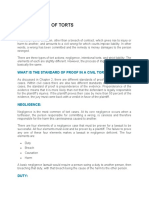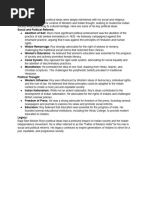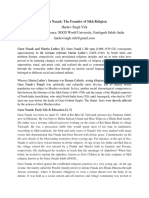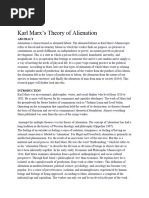0 ratings0% found this document useful (0 votes)
1 viewsWhat is Res Ipsa Loquitur
What is Res Ipsa Loquitur
Uploaded by
nilendumishra500Copyright:
© All Rights Reserved
Available Formats
Download as PDF, TXT or read online from Scribd
What is Res Ipsa Loquitur
What is Res Ipsa Loquitur
Uploaded by
nilendumishra5000 ratings0% found this document useful (0 votes)
1 views1 pageCopyright
© © All Rights Reserved
Available Formats
PDF, TXT or read online from Scribd
Share this document
Did you find this document useful?
Is this content inappropriate?
Copyright:
© All Rights Reserved
Available Formats
Download as PDF, TXT or read online from Scribd
Download as pdf or txt
0 ratings0% found this document useful (0 votes)
1 views1 pageWhat is Res Ipsa Loquitur
What is Res Ipsa Loquitur
Uploaded by
nilendumishra500Copyright:
© All Rights Reserved
Available Formats
Download as PDF, TXT or read online from Scribd
Download as pdf or txt
You are on page 1of 1
Res ipsa loquitur is a Latin phrase that translates to "the thing speaks for itself.
" It's a legal
doctrine used in tort law that allows a court to infer negligence from the very nature of an
accident or injury, even without direct evidence of how the defendant behaved.
Here's how it works:
1. The accident would not normally occur without negligence: The type of accident
must be one that doesn't usually happen unless someone was careless. For example, if a
surgeon accidentally leaves a surgical sponge inside a patient, it's clear that someone
made a mistake.
2. The defendant had exclusive control over the instrumentality that caused the
accident: The defendant must have been in charge of the situation or object that led to
the injury. In the case of the surgical sponge, the surgeon and hospital staff had control
over the operating room.
3. The plaintiff did not contribute to the accident: The plaintiff's own actions must not
have played a role in causing the injury.
When res ipsa loquitur applies, the burden of proof shifts to the defendant. Instead of the
plaintiff having to prove that the defendant was negligent, the defendant must prove that they
were not negligent. This can be a significant advantage for plaintiffs, especially in cases where
it's difficult to obtain direct evidence of the defendant's actions.
Example:
● A man is walking down the street when a barrel of flour falls from a window above and
hits him. There's no direct evidence of who dropped the barrel or why. However, the fact
that a barrel fell from a window suggests that someone was negligent in handling it. In this
case, res ipsa loquitur could be applied, and the burden of proof would shift to the owner
of the building to explain how the accident happened without negligence on their part.
It's important to note that res ipsa loquitur is not a guarantee of success in a lawsuit. The
specific requirements and applications of the doctrine can vary depending on the jurisdiction
and the specific facts of the case.
You might also like
- Contributory and Composite Negligence Under Law of TortsDocument20 pagesContributory and Composite Negligence Under Law of TortsSiddhant MathurNo ratings yet
- 1res Ipsa Loquitur Tort Law 1Document13 pages1res Ipsa Loquitur Tort Law 1Prachi KokaneNo ratings yet
- Transportation Law AssignmentDocument30 pagesTransportation Law AssignmentAshAngeLNo ratings yet
- Res Ipsa LoquiturDocument10 pagesRes Ipsa Loquiturjohn7tagoNo ratings yet
- General Defences in Tort LawDocument9 pagesGeneral Defences in Tort LawTilakNo ratings yet
- What Is Res Ipsa LoquiturDocument4 pagesWhat Is Res Ipsa Loquiturrishirawatfreefire1No ratings yet
- Res Ipsa Loquitur (OVIP)Document2 pagesRes Ipsa Loquitur (OVIP)thewoleogidanNo ratings yet
- Neg HalfDocument13 pagesNeg HalfMehrab 2.ONo ratings yet
- Res Ipsa LoquiturDocument9 pagesRes Ipsa LoquiturXymon BassigNo ratings yet
- NEGLIGENCEDocument39 pagesNEGLIGENCERAJAMRITNo ratings yet
- G-D TORTDocument7 pagesG-D TORTAfsanaNo ratings yet
- Volenti Non Fit Injuria An AnalysisDocument8 pagesVolenti Non Fit Injuria An Analysistenzinwangchu35742No ratings yet
- MCD v. SubhagwatiDocument8 pagesMCD v. SubhagwatiRey SinghaniyaNo ratings yet
- Doctrine of Res Ipsa LoquiturDocument3 pagesDoctrine of Res Ipsa Loquituralfred benedict bayanNo ratings yet
- Torts ProjectDocument16 pagesTorts ProjectShraddha JindalNo ratings yet
- Professional Negligence and The Doctrine of Res Ipsa LoquiturDocument7 pagesProfessional Negligence and The Doctrine of Res Ipsa LoquiturAlthea AlcalaNo ratings yet
- MGMT 260 CH 5 PT II SLDocument13 pagesMGMT 260 CH 5 PT II SLqhaweseithNo ratings yet
- Torts PrithviDocument9 pagesTorts Prithviabhishekmalik3651No ratings yet
- Tort - Outline: Duty Causation HarmDocument6 pagesTort - Outline: Duty Causation HarmSawyer LikeNo ratings yet
- General Defences 2Document21 pagesGeneral Defences 2darkgamerid1337No ratings yet
- Negligence 1Document4 pagesNegligence 1azizur rahamanNo ratings yet
- The Thing Speaks For ItselfDocument10 pagesThe Thing Speaks For ItselfJun AmaroNo ratings yet
- Case DoctrinesDocument8 pagesCase DoctrinesSara Andrea SantiagoNo ratings yet
- Elements and Proofs of Negligence: Grep 204: Liabilities and Ris Ks in Teaching Physical Edu CationDocument31 pagesElements and Proofs of Negligence: Grep 204: Liabilities and Ris Ks in Teaching Physical Edu CationCatherine Sagario OliquinoNo ratings yet
- WEEK 3 Negligence Breach of Duty and DamagesDocument5 pagesWEEK 3 Negligence Breach of Duty and DamagesKarrenKayNo ratings yet
- Proof of NegligenceDocument2 pagesProof of NegligenceShivam ShuklaNo ratings yet
- Law On TorsDocument22 pagesLaw On TorsErwin SabornidoNo ratings yet
- Negligence, Strict and Absolute LiabiltyDocument19 pagesNegligence, Strict and Absolute LiabiltyNeeharika Maniar100% (1)
- NEGLIGENCEDocument37 pagesNEGLIGENCEAryan DixitNo ratings yet
- Res Ipsa Loquitur I. Brief Origin and DefinitionDocument4 pagesRes Ipsa Loquitur I. Brief Origin and DefinitionRay John Arandia DorigNo ratings yet
- TortsDocument14 pagesTortsaswinecebeNo ratings yet
- Law of TortDocument8 pagesLaw of TortAnas AbdulrahmanNo ratings yet
- DAMAGESDocument1 pageDAMAGESnavraj.pannu94No ratings yet
- Res Ipsa Loquitur: "The Thing Speaks For Itself"Document23 pagesRes Ipsa Loquitur: "The Thing Speaks For Itself"reynoldNo ratings yet
- Group Four Torts-1Document10 pagesGroup Four Torts-1stellamarismutindi433No ratings yet
- Chapter 5Document20 pagesChapter 5Bianca AlmacenNo ratings yet
- Musa Kabea.Document4 pagesMusa Kabea.Happy MremaNo ratings yet
- A-III Defences Against Tortious LiabilityDocument9 pagesA-III Defences Against Tortious LiabilityDaksh PooniaNo ratings yet
- Unit 3 - Torts and Insurance LawDocument17 pagesUnit 3 - Torts and Insurance LawmmNo ratings yet
- Torts Class 7 (Let's Go Nlu)Document16 pagesTorts Class 7 (Let's Go Nlu)ks0090824No ratings yet
- Law of Torts - Unit 2 EnglishDocument64 pagesLaw of Torts - Unit 2 EnglishDevanandNo ratings yet
- ResDocument9 pagesResShivam ShuklaNo ratings yet
- Assignment Iii - Law of Torts Riya Singh 19FLICDDNO1106 Bba - LLB (Hons) Sec BDocument2 pagesAssignment Iii - Law of Torts Riya Singh 19FLICDDNO1106 Bba - LLB (Hons) Sec BRiya SinghNo ratings yet
- The Law of TortDocument23 pagesThe Law of Tortjoshuakalehmwalakha100% (1)
- LAW OF TORTS NdidiDocument92 pagesLAW OF TORTS NdidiGrace MwendeNo ratings yet
- Law of TortsDocument12 pagesLaw of Tortsrishavvv98017No ratings yet
- Definition of Res Ipsa Loquitur: PronouncedDocument5 pagesDefinition of Res Ipsa Loquitur: PronouncedSyed Haris ShahNo ratings yet
- Breach of DutyDocument4 pagesBreach of DutyLady Bernadette PayumoNo ratings yet
- Res Ipsa LoquiturDocument7 pagesRes Ipsa LoquiturmonekaNo ratings yet
- NegligenceDocument8 pagesNegligencetalhadaudzai043No ratings yet
- 1st Sem, Torts, NegligenceDocument5 pages1st Sem, Torts, NegligenceArjun SNo ratings yet
- Torts AssignmentDocument27 pagesTorts AssignmentRajratna DongargaonkarNo ratings yet
- DELICT Lecture NotesDocument21 pagesDELICT Lecture Notesngozi_vinel88% (8)
- Dr. Fernando P. Solidum V. People G.R. No. 192123 March 10, 2014 Bersamin, J.: FactsDocument2 pagesDr. Fernando P. Solidum V. People G.R. No. 192123 March 10, 2014 Bersamin, J.: FactsDutchsMoin MohammadNo ratings yet
- Module IV Decision Making Base On Public or Private Law FinalDocument7 pagesModule IV Decision Making Base On Public or Private Law FinalCristina GreyNo ratings yet
- 06 Law of Torts-Teachers PDFDocument21 pages06 Law of Torts-Teachers PDFKeshav SharmaNo ratings yet
- Causation in LawDocument3 pagesCausation in Lawakilyall789No ratings yet
- General Defenses in TortDocument6 pagesGeneral Defenses in TortAbby NawazNo ratings yet
- Zurn 2014 The Politicization of World Politics and Its Effects Eight PropositionsDocument26 pagesZurn 2014 The Politicization of World Politics and Its Effects Eight Propositionsnilendumishra500No ratings yet
- DeclarationDocument2 pagesDeclarationnilendumishra500No ratings yet
- Political Ideas of Raja Rammohan RoyDocument1 pagePolitical Ideas of Raja Rammohan Roynilendumishra500No ratings yet
- JL-331 Pi-26Document2 pagesJL-331 Pi-26nilendumishra500No ratings yet
- JL-137 Ror-280Document2 pagesJL-137 Ror-280nilendumishra500No ratings yet
- Student Admission ChallanDocument1 pageStudent Admission Challannilendumishra500No ratings yet
- Vidyasagar University: B.A. Honours 4Th Semester Examination, 2023Document1 pageVidyasagar University: B.A. Honours 4Th Semester Examination, 2023nilendumishra500No ratings yet
- ShahJahan 10766721Document158 pagesShahJahan 10766721nilendumishra500No ratings yet
- Guru Nanak Founderof Sikh ReligionDocument6 pagesGuru Nanak Founderof Sikh Religionnilendumishra500No ratings yet
- Symbolic Interactionism: The BasicsDocument22 pagesSymbolic Interactionism: The Basicsnilendumishra5000% (1)
- hARSHABHARDHAN RELIGIONDocument13 pageshARSHABHARDHAN RELIGIONnilendumishra500No ratings yet
- Tanvi MenonDocument17 pagesTanvi Menonnilendumishra500No ratings yet
- Sufism Origin and Basic ConceptsDocument8 pagesSufism Origin and Basic Conceptsnilendumishra500No ratings yet
- Ramananda RamanyaDocument4 pagesRamananda Ramanyanilendumishra500No ratings yet
- Noorjahan ZuntaDocument1 pageNoorjahan Zuntanilendumishra500No ratings yet
- Vedic Civilization 1Document11 pagesVedic Civilization 1nilendumishra5000% (1)
- Sri ChaitanyaDocument11 pagesSri Chaitanyanilendumishra500No ratings yet
- Factors Vitiating Free ConsentDocument2 pagesFactors Vitiating Free Consentnilendumishra500No ratings yet
- Triratna in JainismDocument3 pagesTriratna in Jainismnilendumishra500No ratings yet
- Iltutmish of Slave DynastyDocument7 pagesIltutmish of Slave Dynastynilendumishra500No ratings yet
- Roudro Mukhopadhyay Karl Marx Theoryof AlienationDocument6 pagesRoudro Mukhopadhyay Karl Marx Theoryof Alienationnilendumishra500No ratings yet
- Lecture 13 Text200220060602024747Document12 pagesLecture 13 Text200220060602024747nilendumishra500No ratings yet
- Img20230110 20350478Document1 pageImg20230110 20350478nilendumishra500No ratings yet


















































































